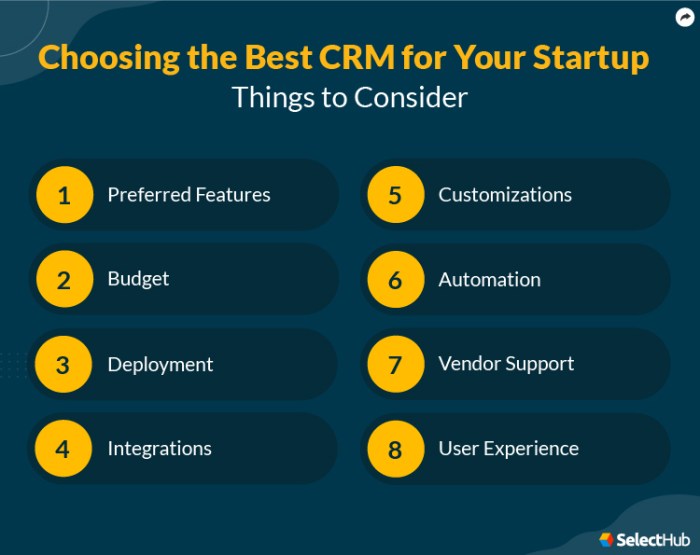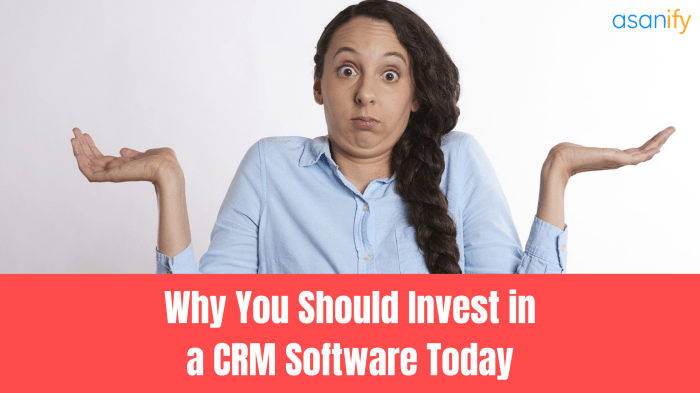Best crm software for startups – Choosing the right Customer Relationship Management (CRM) software is crucial for any startup. A well-implemented CRM system can streamline operations, improve customer relationships, and ultimately drive growth. However, with a plethora of options available, selecting the best fit can feel overwhelming. This comprehensive guide will help you navigate the landscape of CRM software, focusing on solutions ideal for startups with varying needs and budgets.
Understanding Your Startup’s CRM Needs
Before diving into specific software, it’s essential to define your startup’s unique requirements. Consider these key factors:
- Size and Growth Stage: Are you a pre-seed startup with a handful of customers, or are you experiencing rapid growth? Your choice will depend on scalability and the ability to adapt as your business expands.
- Industry: Different industries have unique CRM needs. A SaaS startup will have different requirements than a retail business or a consulting firm. Consider functionalities like project management, inventory tracking, or service scheduling.
- Budget: CRM software ranges from free plans with limited features to enterprise-level solutions with hefty price tags. Startups often operate on tight budgets, so finding a balance between features and cost is crucial.
- Technical Expertise: Some CRMs are user-friendly and require minimal technical knowledge, while others demand more advanced skills for setup and customization. Choose a system that aligns with your team’s capabilities.
- Integration Needs: Consider integrating your CRM with other essential tools, such as email marketing platforms (Mailchimp, Constant Contact), accounting software (Xero, QuickBooks), and social media management tools (Hootsuite, Buffer).
Top CRM Software Options for Startups: Best Crm Software For Startups
Here’s a breakdown of some of the best CRM software options tailored for startups, categorized by their strengths:
A. Affordable and Easy-to-Use CRMs:, Best crm software for startups
- HubSpot CRM: A popular choice for startups, HubSpot offers a robust free plan with excellent features including contact management, deal tracking, and basic email integration. Its intuitive interface makes it easy to learn and use, even for non-technical users. [Source: HubSpot CRM ]
- Zoho CRM: Another strong contender in the affordable CRM space, Zoho offers a comprehensive suite of tools, including sales, marketing, and customer support features. It’s highly customizable and scalable, making it suitable for startups at various growth stages. [Source: Zoho CRM ]
- Freshsales: Known for its user-friendly interface and powerful automation capabilities, Freshsales is a great option for startups looking to streamline their sales processes. Its affordable pricing and robust features make it a compelling choice. [Source: Freshsales ]
B. Mid-Range CRMs with Advanced Features:
- Salesforce Sales Cloud (Essentials Plan): While Salesforce is known for its enterprise-level solutions, its Essentials plan provides a more affordable entry point for startups. It offers a powerful set of features, but may require more technical expertise to set up and configure. [Source: Salesforce Sales Cloud ]
- Pipedrive: Pipedrive is designed specifically for sales teams, focusing on deal management and pipeline visualization. Its intuitive interface and straightforward approach make it a good choice for startups prioritizing sales efficiency. [Source: Pipedrive ]
C. Specialized CRMs for Specific Needs:
- Agile CRM: A comprehensive CRM with a strong focus on marketing automation and social media integration. Ideal for startups heavily reliant on digital marketing strategies. [Source: Agile CRM ]
- Insightly: A good option for startups needing project management capabilities integrated directly within their CRM. Useful for businesses with complex projects and collaborative workflows. [Source: Insightly ]
Key Features to Consider in a Startup CRM
Regardless of your chosen platform, ensure your CRM offers these essential features:
- Contact Management: Efficiently store and manage customer information, including contact details, communication history, and purchase records.
- Deal/Opportunity Management: Track sales opportunities, manage pipelines, and forecast revenue.
- Sales Automation: Automate repetitive tasks such as email marketing, follow-ups, and lead scoring.
- Reporting and Analytics: Gain valuable insights into customer behavior, sales performance, and marketing effectiveness.
- Customer Support Features: Manage customer inquiries, track support tickets, and resolve issues efficiently.
- Integration Capabilities: Seamlessly integrate with other essential business tools.
- Scalability: The ability to adapt and grow with your business as it expands.
- Mobile Accessibility: Access your CRM data anytime, anywhere.
Choosing the Right CRM for Your Startup: A Step-by-Step Guide
1. Assess your needs
Define your specific requirements, considering factors like budget, team size, and industry.
2. Research different options
Explore the CRMs mentioned above and others that fit your criteria. Check reviews and compare features.

Source: selecthub.com
3. Try free trials or demos

Source: asanify.com
Most CRM providers offer free trials or demos. Take advantage of this to test the software and ensure it meets your needs.
4. Consider long-term scalability
Choose a CRM that can grow with your business, avoiding the need for frequent migrations.
5. Evaluate integration capabilities
Ensure the CRM integrates with your existing tools.
6. Check customer support
Good customer support is crucial, especially for startups.
7. Make your decision
Based on your evaluation, select the CRM that best fits your budget, needs, and long-term goals.
Frequently Asked Questions (FAQ)
- Q: What is the best free CRM for startups? A: HubSpot CRM and Zoho CRM offer excellent free plans with many features. However, free plans often have limitations on user numbers and storage.
- Q: How much does CRM software cost? A: CRM pricing varies widely, from free plans to thousands of dollars per month for enterprise solutions. Startups can find affordable options starting at a few dollars per user per month.
- Q: How long does it take to implement a CRM? A: Implementation time depends on the CRM’s complexity and your team’s technical skills. Simpler CRMs can be implemented within days, while more complex systems may take weeks or months.
- Q: What are the benefits of using a CRM for a startup? A: CRMs improve customer relationships, streamline sales processes, automate tasks, provide valuable data insights, and ultimately contribute to business growth.
- Q: Can I switch CRMs later? A: Yes, you can switch CRMs. However, migrating data can be time-consuming, so careful planning is essential.
Call to Action
Ready to supercharge your startup’s growth with the right CRM? Start your free trial today and experience the difference! Explore the options discussed above and find the perfect fit for your business.
Top FAQs
What is the average cost of CRM software for startups?
Costs vary greatly depending on features and the number of users, ranging from free plans with limited functionality to thousands of dollars per month for enterprise-level solutions. Many offer tiered pricing to accommodate various budgets.
How long does it typically take to implement a CRM?
Implementation time depends on the complexity of the CRM and the size of your company. Simple systems might be implemented within weeks, while more complex ones could take months. Thorough planning and training are key to a smooth implementation.
Can I integrate my CRM with other business tools?
Yes, most modern CRMs offer integrations with other popular business tools such as email marketing platforms, accounting software, and e-commerce platforms. Check for specific integrations before choosing a CRM.
What are some key features to look for in a startup CRM?
Essential features include contact management, lead tracking, sales pipeline management, reporting and analytics, and customer communication tools. Consider features that align with your specific sales and marketing processes.
